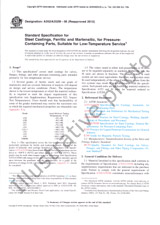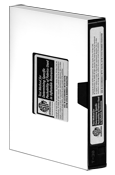We need your consent to use the individual data so that you can see information about your interests, among other things. Click "OK" to give your consent.
ASTM D6478-10(2019)
Standard Test Method for Determining Specific Packability of Fabrics Used in Inflatable Restraints
Translate name
STANDARD published on 1.1.2019
The information about the standard:
Designation standards: ASTM D6478-10(2019)
Publication date standards: 1.1.2019
SKU: NS-910850
The number of pages: 10
Approximate weight : 30 g (0.07 lbs)
Country: American technical standard
Category: Technical standards ASTM
The category - similar standards:
Annotation of standard text ASTM D6478-10(2019) :
Keywords:
airbag, fabric, inflatable restraint, packability, packing, volume,, ICS Number Code 43.040.60 (Bodies and body components), 59.080.30 (Textile fabrics)
These adjuncts apply to this standard:
Adjunct to D6478 Test Method for Determining Specific Packability of Fabrics Used in Inflatable Restraints
Selected format:Show all technical information.
Adjunct to D6478 Standard Test Method for Determining Specific Packability of Fabrics Used in Inflatable Restraints
Selected format:Show all technical information.
Additional information
| Significance and Use | ||||||||||||||
|
5.1 This test method is useful for determining the specific packability of uncoated and coated airbag fabrics. Fabric packability is an important factor in the design of airbag modules due to their inherent spacial constraints. 5.2 A folded specimen exhibits better specific packability if it occupies a lower total volume at the specified loads compared to another specimen. 5.3 The time required to test one sample (four specimens from the same lot of fabric) is approximately 1.5 h using this test method. Due to the length of time required by this test method to perform a single test, this test method is most suitable for use in design and development analysis or for inclusion in a list of required tests conducted for annual certification of an airbag fabric. |
||||||||||||||
| 1. Scope | ||||||||||||||
|
1.1 This test method covers procedures for determining the ability to fold and pack fabrics used for inflatable restraints using an index of specific packability. 1.2 Procedures in this test method describe operator techniques that must be followed closely to obtain repeatable and accurate results. Since these techniques are difficult to convey in writing, supplemental training for operators is required. A training video is available from ASTM (see Adjuncts ADJD6478 and ADJD6478A). 1.3 The values stated in SI units are to be regarded as standard. No other units of measurement are included in this standard. 1.4 Procedures and apparatus other than those stated in this practice may be used as agreed upon between the purchaser and the supplier with specific deviations from this practice acknowledged in the report. 1.5 This standard does not purport to address all of the safety concerns, if any, associated with its use. It is the responsibility of the user of this standard to establish appropriate safety, health, and environmental practices and determine the applicability of regulatory limitations prior to use. 1.6 This international standard was developed in accordance with internationally recognized principles on standardization established in the Decision on Principles for the Development of International Standards, Guides and Recommendations issued by the World Trade Organization Technical Barriers to Trade (TBT) Committee. |
||||||||||||||
| 2. Referenced Documents | ||||||||||||||
|
We recommend:
Technical standards updating
Do you want to make sure you use only the valid technical standards?
We can offer you a solution which will provide you a monthly overview concerning the updating of standards which you use.
Would you like to know more? Look at this page.






 Cookies
Cookies
